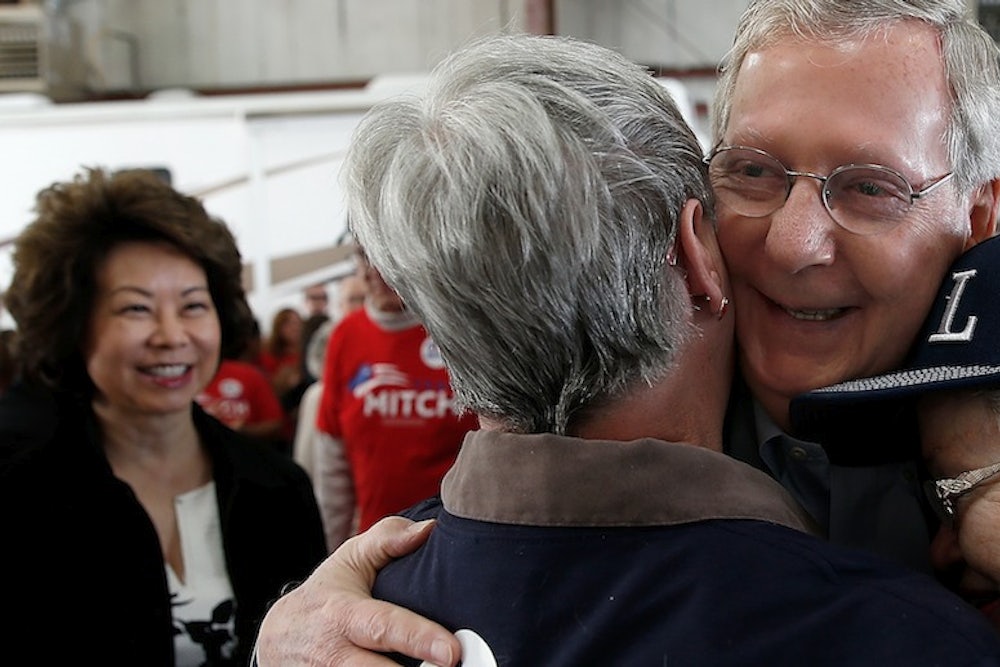At some point in just about any campaign, a candidate will spin or shade his record or platform. No politician's history and agenda is entirely good and popular but they put all of it in a good light no matter what questions come their way. It's unusual, however, for a politician to disclaim all of his (and his party's) objectives rather than simply frame them in positive terms (liberty restoring, job creating, etc.).
But that's exactly what Senate Minority Leader Mitch McConnell is doing in Kentucky, where he's running an unexpectedly tough re-election campaign against Democrat Alison Lundergan Grimes.
In the midst of a rote, predictable partisan spin war over Medicare, McConnell's campaign last week made an incredible claim. With respect to McConnell's position on Congressman Paul Ryan's 2011 budget, which would've phased out Medicare's government payer and replaced it with an increasingly ungenerous program of subsidized private insurance, his campaign said, “There is no way to speculate if [McConnell] would have voted for final passage without having debated amendments.”
McConnell rests this claim on a technicality. In 2011 the Senate didn't vote on the question of whether to adopt the Ryan budget. Instead it conducted a test vote on the question of whether to debate it in the first place. Forty Republicans, including McConnell, voted yes. This was understood by everybody at the time to be the Senate GOP's opportunity (or misfortune, depending on your perspective) to go on record in support of Ryan's plan. McConnell himself explained the truism to David Gregory on "Meet the Press" when Gregory pressed him on his support for Ryan's Medicare plan. "I voted for the Ryan budget this week," he said.
In any case, the argument Democrats are making is about Ryan's actual blueprint. Not a hypothetically altered blueprint. The Medicare privatization plan was in the blueprint. So the question isn't whether he would've supported a heavily altered version of the Ryan budget but whether he agreed with almost everyone else in the Republican Party that the Ryan budget itself was the platonic expression of the party's policy agenda.
And we know exactly how he felt about it. Writing at Salon last week, Simon Maloy did the yeoman's work of finding all the wonderful things McConnell had to say about that plan on the Senate floor. More abstractly, McConnell has explicitly acknowledged that Republicans hope to roll back the New Deal consensus if they're ever given large enough majorities in Congress and the White House.
"We have elections in this country and the winners get to make policy and the losers go home," he explained on Kentucky radio in August of 2012. "And the Democrats have had Congress, sometimes with whopping majorities, most of the time since the New Deal. And that's a great disappointment—I think that's the reason the country has the kind of debt and deficit that it has, because we've not been able to secure the support of enough of the American people to have the kind of big majorities you need to kind of roll things back. Maybe some day we'll have that. I hope so."
So the record here is crystal clear. It's almost as clear as his position on the Affordable Care Act, which is that it should be repealed "root and branch." But in Kentucky, that would mean eliminating the state's popular insurance exchange, Kynect, and its successful Medicaid expansion. So McConnell is also trying to disclaim that position as well, suggesting—again, not credibly—that Kentucky could keep all of Obamacare's goodies even if Republicans repeal the law in its entirety. That swindle would be impossible to perpetrate under most circumstances, but McConnell's managed to pull it off because the Grimes campaign doesn't really want to make Obamacare an issue, even when they can use it to press their own advantage.
If you follow domestic politics closely, this is pretty disorienting. Its reminiscent of Mitt Romney's first debate with President Barack Obama, when he disavowed the fiscal agenda that defined his candidacy. At the time, Obama aides cited that about-face as one of the reasons Obama performed so poorly that night.
That strategy backfired on Romney as the campaign wore on. The question now is whether it'll backfire on McConnell—if not for what it suggests about his forthrightness than for what it says about his effectiveness as a potential majority leader.
Repealing Obamacare and implementing the Ryan budget is what the GOP exists to do. And if the top Republican in the Senate won't defend his party's positions politically, there's every reason to suspect the party itself wouldn't be able to execute on the vision, if ever given the chance.
